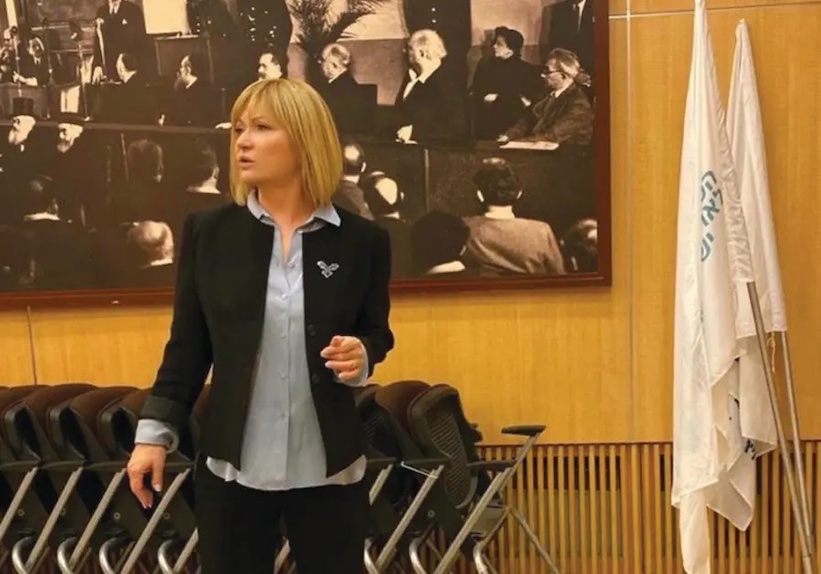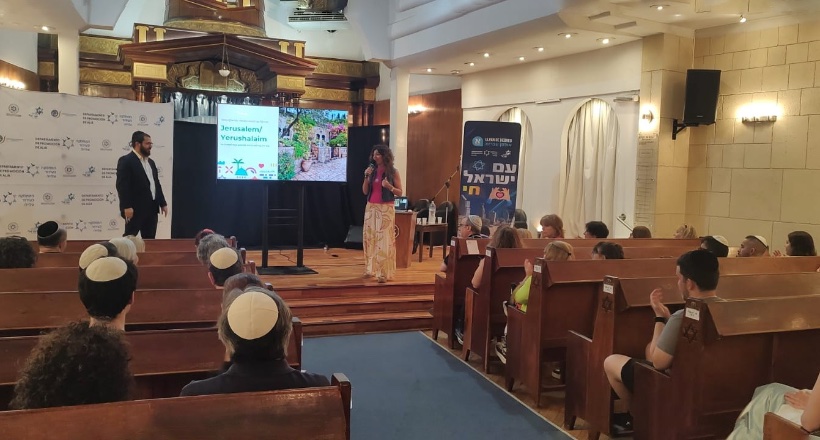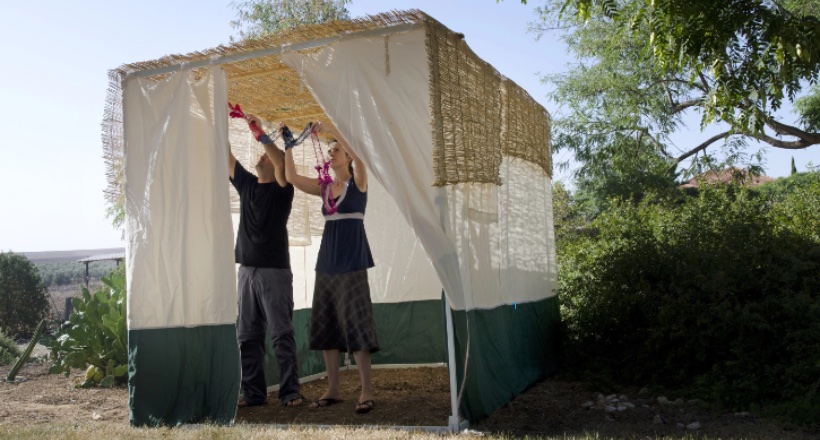A network of 1,200 intensive Hebrew courses exist throughout the Jewish world
‘Once upon a time, the Jewish people needed a country; today, the country needs people.” With this pithy phrase, Marina Rosenberg-Koritny, head of the Aliyah Promotion Department of the World Zionist Organization, succinctly defines her position.
In October 2015, when the World Zionist Organization decided to create an Aliyah Promotion Department to encourage and stimulate aliyah, Rosenberg-Koritny was selected to head the new division. Rosenberg-Koritny herself had made aliyah in 1995 from Kazakhstan with her husband and one-year-old son and was intimately familiar with the challenges and difficulties of moving to a new country and learning Hebrew. “One of the most important things in moving to Israel is learning the language,” she says. Doing so is an essential aspect of national identification in Israel, and immigrants who come to Israel knowing Hebrew adapt themselves successfully.
Marina Rosenberg-Koritny: ‘We adjust their expectations to the reality of life here.’ (World Zionist Organization)
After becoming head of the new department, she established a network of 1,200 intensive Hebrew courses throughout the Jewish world: in France, Latin America, North America and the United Kingdom. A Hebrew language course is known as an ulpan. For many of the students, these courses have united the Jewish community where they live and enhanced Jewish life, many of whom live in areas far from established Jewish communities. “I attended an ulpan graduation party in France,” says Rosenberg-Koritny, “and a man who lived some 30 km. outside Paris, took me by the hand, and said, ‘You don’t realize how important your work is. We had no real community until you opened an ulpan. The Jews started to gather again. Now we have a community.’ These kinds of reports make us very happy and give us the strength to do our work”. In France alone, there are now 125 different Hebrew classes being offered.
With the outbreak of the pandemic, all WZO ulpan classes throughout the world have successfully moved to the Zoom video platform. All told, the WZO Hebrew program reaches an audience of 250,000 Jews worldwide each year, says Rosenberg-Koritny. The Hebrew language classes are taught by local teachers, who have been trained by the World Zionist Organization.
Rosenberg-Koritny explains that the ulpan classes familiarize students about life in Israel. “We teach them the language, and we also tell them about what is happening in Israel. We adjust their expectations to the reality of life here.” In addition, the World Zionist Organization organizes special courses for doctors and lawyers to give them the tools that they will need to resume their careers when they arrive in Israel. The Hebrew language courses are for students ages 18 and up, but Rosenberg-Koritny says they have begun pilot programs for 16- and 17-year-old students in Argentina to teach them Hebrew and prepare them for the psychometric exam before moving to Israel. On a pre-coronavirus visit to South America, Rosenberg-Koritny visited a Jewish high school in Argentina. After meeting with the students, she understood the need to introduce them to Israel and Hebrew language programs even while still of high-school age. “If we don’t start with them when they are young, and present Israel as an option, we will lose them. We have to give them the feeling that they have a place in the world to come whenever they are ready.” Rosenberg-Koritny humorously recalls one conversation she had with a high school student at that same meeting. The boy knew about Israel’s reputation as the “Start-up Nation” and was pessimistic about being able to move to Israel because he was not particularly talented in computers, math,or physics. He did, however, have an aptitude for sports. “I said to him, ‘That’s great. Sport is not that well developed here yet.’ They don’t know there are other things here – Israel is also culture and education, and many things beyond that.” The Aliyah Promotion Department operates with a staff of six in Israel, and additional staff members in the United States, France, Argentina and Brazil. Rosenberg-Koritny, as the founder and developer of the Aliyah Promotion Department, is continually trying to improve the functionality and efficiency of the department, in order to present aliyah as a practical and possible choice for Jewish people around the world.
The WZO Hebrew program reaches an audience of 250,000 Jews worldwide each year. (World Zionist Organization)
After new olim arrive in Israel, she often asks them questions to find out the reasons behind their decision to move to Israel. One survey that she performed revealed interesting results regarding the decision to make aliyah. “We did a survey and found that in most families, it is the woman who decides to make aliyah. It could be the grandmother or the mother or a sister.” The survey was done with families that had already made aliyah, from France, England, the US, Argentina and the former Soviet Union (FSU), and showed that the push for aliyah came from the women in the family. Armed with this information, Rosenberg-Koritny decided to build pre-aliyah informational programs and seminars tailored for women to explain the educational system and better prepare them and their families for aliyah.
She notes that the pandemic has led to an increase in the number of participants in WZO activities, with more people asking questions about aliyah. Throughout the pandemic, the World Zionist Organization has arranged virtual meetings between prospective olim and representatives of various cities in Israel, including Beersheba, Tel Aviv, Jerusalem, Acre and Ma’alot, among others. During these meetings, prospective olim ask specific questions, learning about professions that are in demand in the various cities. “We prepare them there – in their countries of origin – before they come to Israel. “It is a process,” says Rosenberg-Koritny. “We are building a bridge for them.” Rosenberg-Koritny says she recently received a note from an ulpan teacher in Ra’anana who had taught new olim from Argentina that had studied in the WZO ulpan course while living in Argentina. The teacher complimented Rosenberg-Koritny on the quality of the instruction that the students had received in Argentina. “This shows that we are doing our job right,” says Rosenberg-Koritny proudly.
Looking back over the past 25 years since her aliyah, Rosenberg-Koritny says her position promoting aliyah and learning the Hebrew language is, in a sense, the closing of a circle. “I moved here in 1995 and began to learn Hebrew. Now I help others to decide to make aliyah and learn Hebrew. We have to make it easier for them to come here and make their acclimation easier.”
This article was written in cooperation with the World Zionist Organization, to mark the online 38th World Zionist Congress, October 20-22.






